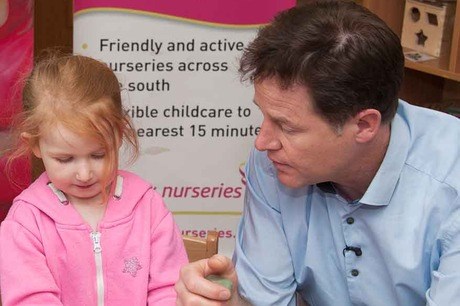Exclusive - Analysis uncovers true cost of party childcare pledges
Hannah Crown
Tuesday, May 5, 2015
Data experts have costed the three main parties' pledges on extended free childcare.

- The Tory pledge to provide 30 hours per week for three and four-year-olds comes in at £4.6bn, even at current funding rates
- Labour's 25 hours for three and four-year-olds pledge would leave settings with a deficit of £551 per child per year
- The Lib Dems, whose two-year-old scheme comes out at £2.2bn in total, have now said they would consider a funding review, along with the Tories
Politicians' promises to give parents more free childcare would leave the sector with a funding gap of hundreds of millions of pounds, exclusive new analysis shows.
After a series of announcements on extensions to free childcare schemes, data company Ceeda has delved into the detail to work out the likely costs of each of the key childcare pledges.
According to the research, which uses current hourly rates to calculate how much money each policy would need, a Tory pledge to extend free childcare for three and four-year-olds would need an additional £1.5bn. The party has promised an extra £350m for this policy, which they say would be added to with an unspecified amount from savings through universal credit and tax-free childcare. The Lib Dems have said their proposal to extend childcare to all two-year-olds would cost an extra £800m, while the Ceeda data indicates this extra cost would be £1.2bn, based on current rates of funding.
The research was produced for the Pre-School Learning Alliance, which says the current system is already significantly underfunded. Alliance chief executive Neil Leitch said, 'These figures clearly illustrate that extending free entitlement schemes without addressing existing funding shortfalls is a recipe for total disaster.
'The Alliance, and the sector, has long raised the issue of underfunding, so for the major parties to make these pledges while knowing full well that they are undeliverable in practice is frankly irresponsible.
'While these pledges are intended to increase childcare availability, they are likely to have the opposite effect, as providers who cannot afford to plug ever-widening funding gaps are likely to start to limit the number of "free" places that they offer.'
The sector has reacted with little surprise at the news. John Woodward, co-founder of Busy Bees, the UK's largest nursery chain, said, 'It is always good to see more commitments towards childcare, but none of these promises will work unless there is basic undertaking that you have to pay providers enough money to cover the costs.'
Data from Ceeda last year found that existing 'free' three and four-year-old places are underfunded to the tune of £177m per year in non-domestic private voluntary and independent (PVI) childcare settings.
The company's managing director, Jo Verrill, said the research 'clearly demonstrates the inadequacy of current funding levels in PVI nurseries and pre-schools.' Dr Verrill said, 'The maths is simple and stark; further expansion of underfunded "free" provision will increase the cost of childcare for fee-paying parents and place unsustainable financial pressure on many settings.'
The pledges in detail
CONSERVATIVES
The number of hours available to three and four-year-old children of 'working families' will increase from 15 to 30, the Tories announced last month. Yet childcare minister Sam Gyimah said just six months ago, 'I don't detect enthusiasm for settings to provide more hours' and predicted in January that Labour's policy to extend free three and four-year-old provision to 25 hours per week would cost £1.6bn.
The Tories have now promised a funding review, despite the coalition-run Department for Education (DfE) saying it was 'nonsense to suggest that childcare has been underfunded' in November. Mr Gyimah has since admitted that the system would 'keel over' without a review.
The extended pledge would mean the creation of an extra 630,000 15-hour places for three and four-year-olds, which the Conservatives say would cost an additional £350m. However, according to the research, the true cost of the extra places could be more than four times this, at £1.5bn, based on 2014/15 funding rates. The entire package of 30 hours a week comes in at £4.6bn, or £4.8bn if PVIs are given sufficient funds to break even.
The research also shows the deficit per child each nursery would have to bear under a 30-hour scheme costed at current rates. Currently, the figures indicate a PVI setting loses £330 per 15-hour child per year, which would double to £660 under the 30-hour scheme: a gap of £250m across all PVIs.
A Conservative spokesperson said, 'Our costing takes into account savings through universal credit and tax-free childcare and was generated by Treasury officials. We have a proven record over the last parliament of extending free childcare while getting our deficit down and turning our economy around. This manifesto commitment has been welcomed by groups such as the National Day Nurseries Association and will further help hardworking families with the costs of childcare.'
Steve Scott is managing director of Happy Kids Childcare, which has 75 per cent of children on the free entitlement and targets some of the most deprived areas in the UK. Because his costs are lower than average, he says, the company can make a profit. But he adds, 'If the funding rate doesn't keep up with rising costs next year, we wouldn't be able to. My fear is unless the Government ringfences the money, it can do a review and extend the entitlement but people won't be able to afford to deliver it.'
LABOUR
 Under Labour, the free entitlement for threes and fours would increase to 25 hours per week - the extra ten hours applying to nearly half a million children in working households. Shadow childcare minister Alison McGovern has said that this is 'one of the top priorities for Labour in Government'. She has also said, 'I am passionate about this policy - and about making sure it works'.
Under Labour, the free entitlement for threes and fours would increase to 25 hours per week - the extra ten hours applying to nearly half a million children in working households. Shadow childcare minister Alison McGovern has said that this is 'one of the top priorities for Labour in Government'. She has also said, 'I am passionate about this policy - and about making sure it works'.
Ceeda's data indicates that the £800m set aside for this increase is roughly correct: the data says the policy would actually cost £792m based on current rates and £835m if funded at break-even delivery cost. The total cost for the entire 25 hours policy would be £4.1bn if funded at a break-even rate. However, the party has said nothing about a funding review, and if it pays the same hourly rates as the Coalition, Ceeda's data indicates that nurseries would have to cover a deficit of £551 per child per year - a sector-wide gap of £212m per year for PVIs.
A spokesperson for shadow education secretary Tristram Hunt said, 'We are confident in our costings and that the policy is deliverable.'
LIBERAL DEMOCRATS
 Childcare is a personal priority for Nick Clegg, and his party has made several pledges aimed at parents of children aged between nine months and four years old. One of these is extending the current 15 hours free childcare from the 40 per cent most disadvantaged to all twos.
Childcare is a personal priority for Nick Clegg, and his party has made several pledges aimed at parents of children aged between nine months and four years old. One of these is extending the current 15 hours free childcare from the 40 per cent most disadvantaged to all twos.
According to the Lib Dems, this will cost an extra £800m. However, Ceeda's calculations indicate this could in fact be an extra £1.2bn at current funding rates and more than £1.3bn if delivered at a break-even cost, with the entire scheme coming to £2.2bn at break-even cost in PVIs. At current rates, there would be a £467 per year deficit per funded child.
A Lib Dem spokesperson said that the party had told the BBC it will also review the funding, though no formal announcement of this review has been made. He said, 'Nick Clegg has been clear ... we will not enter Government unless education, including early years, is protected from cuts. We will work with providers to make sure the funding rate is set at a level that is sustainable and fair.'
Technical note
- The budget estimates assume every eligible child takes up the full offer using the same mix of PVI and maintained provision as reported in the DfE Early Years Census 2014
- Analysis of funding deficits exclude the early years pupil premium and central spend retained by local authorities
- Provision in PVI non-domestic settings is priced using delivery costs published by Ceeda 2014
- The figures make no allowance for the creation of surplus for reinvestment, future inflation or the financial impact of goals to increase qualification levels in the early years
- Maintained and childminding provision is costed on the basis of 2014/2015 delegated funding rates published by the DfE; no data is available to evaluate the incidence or scale of funding gaps in these settings.




